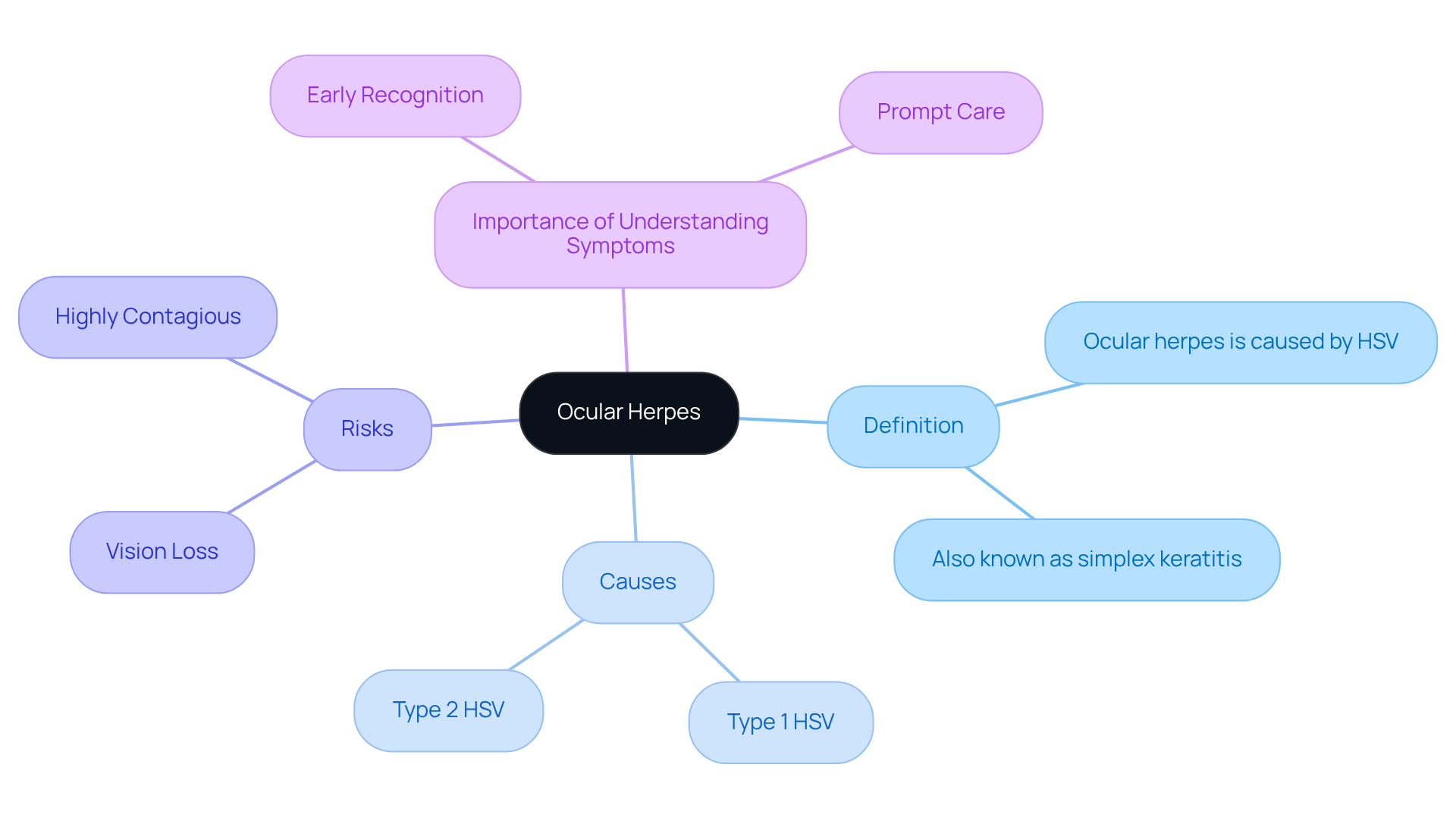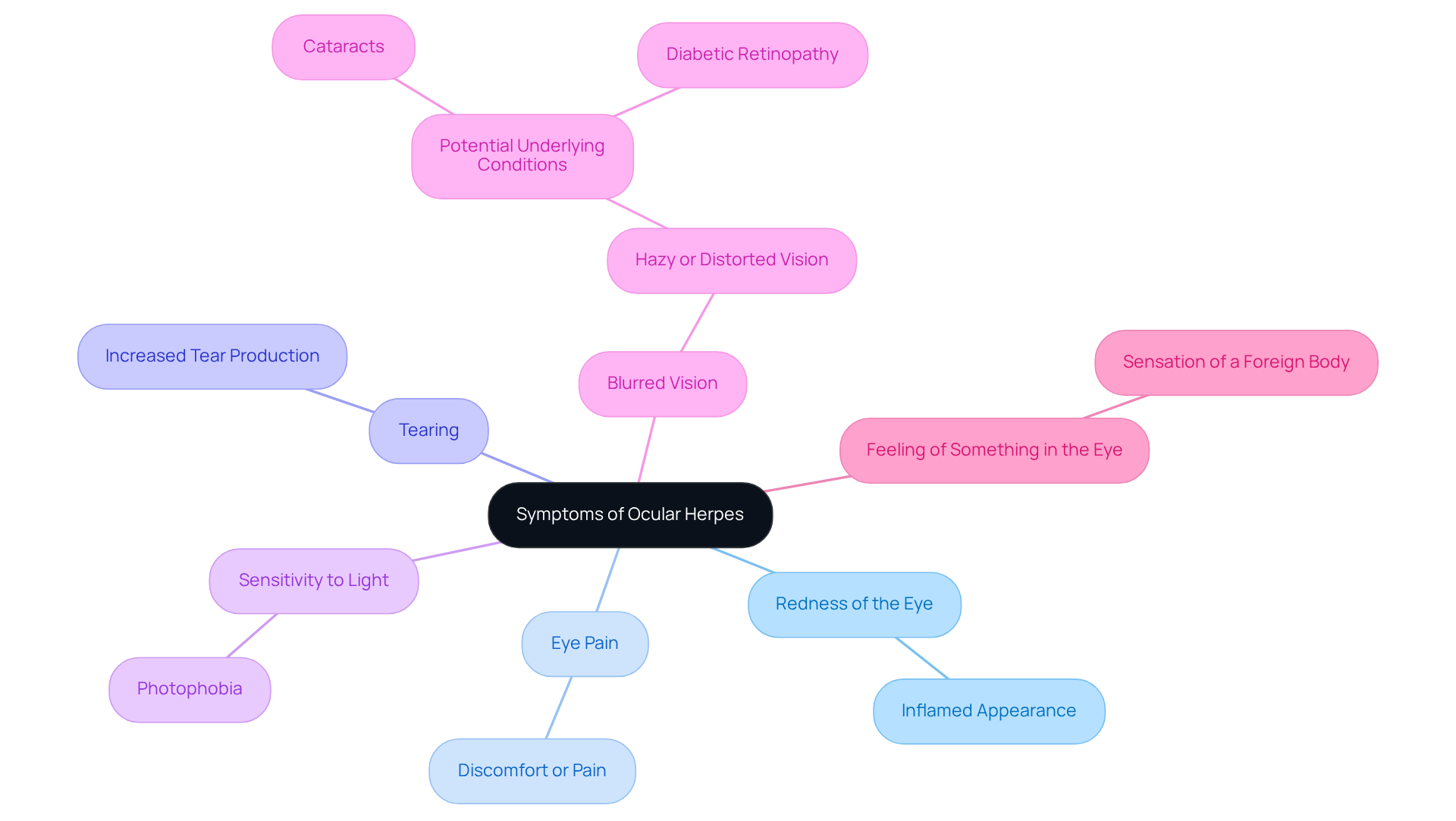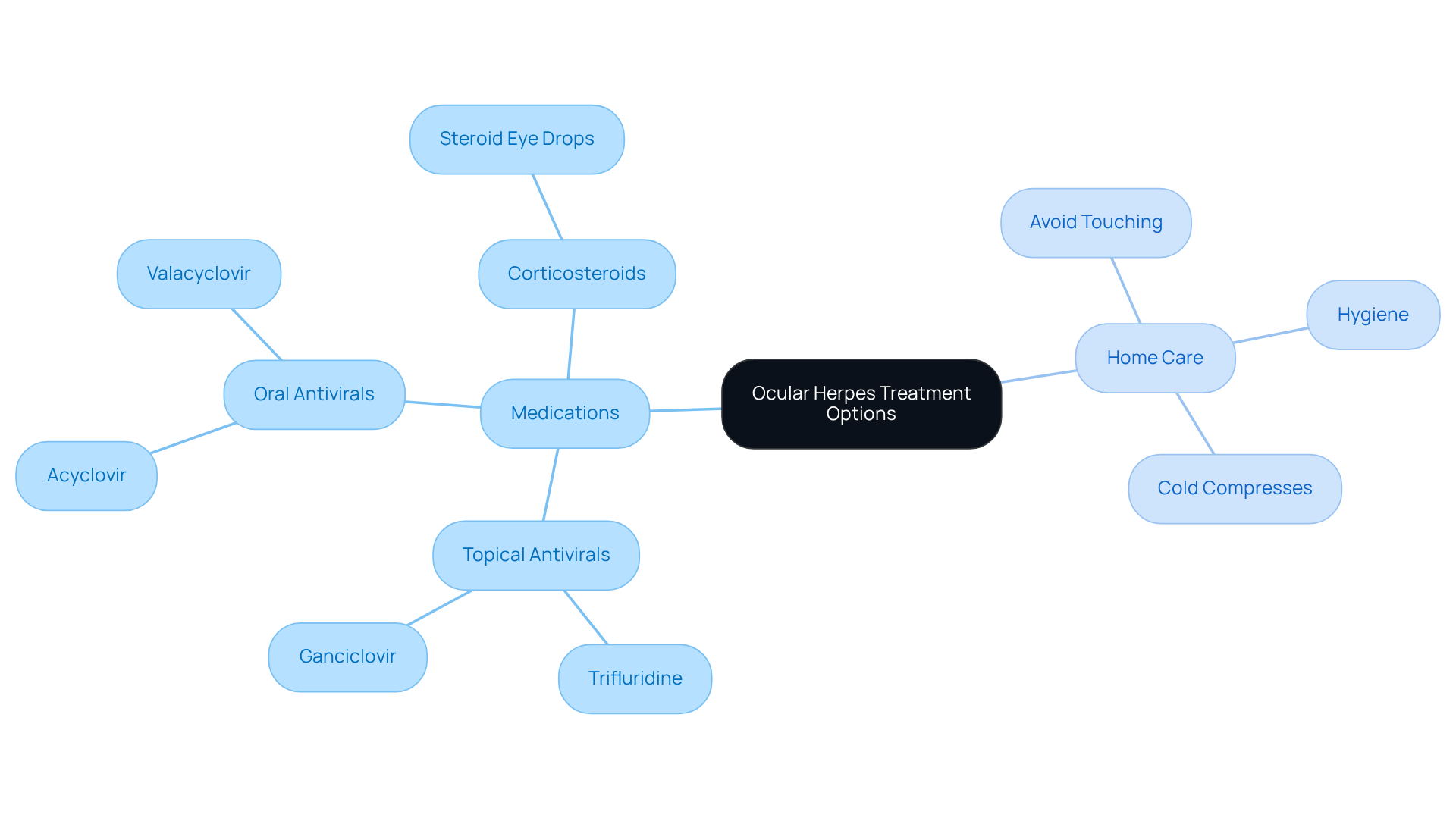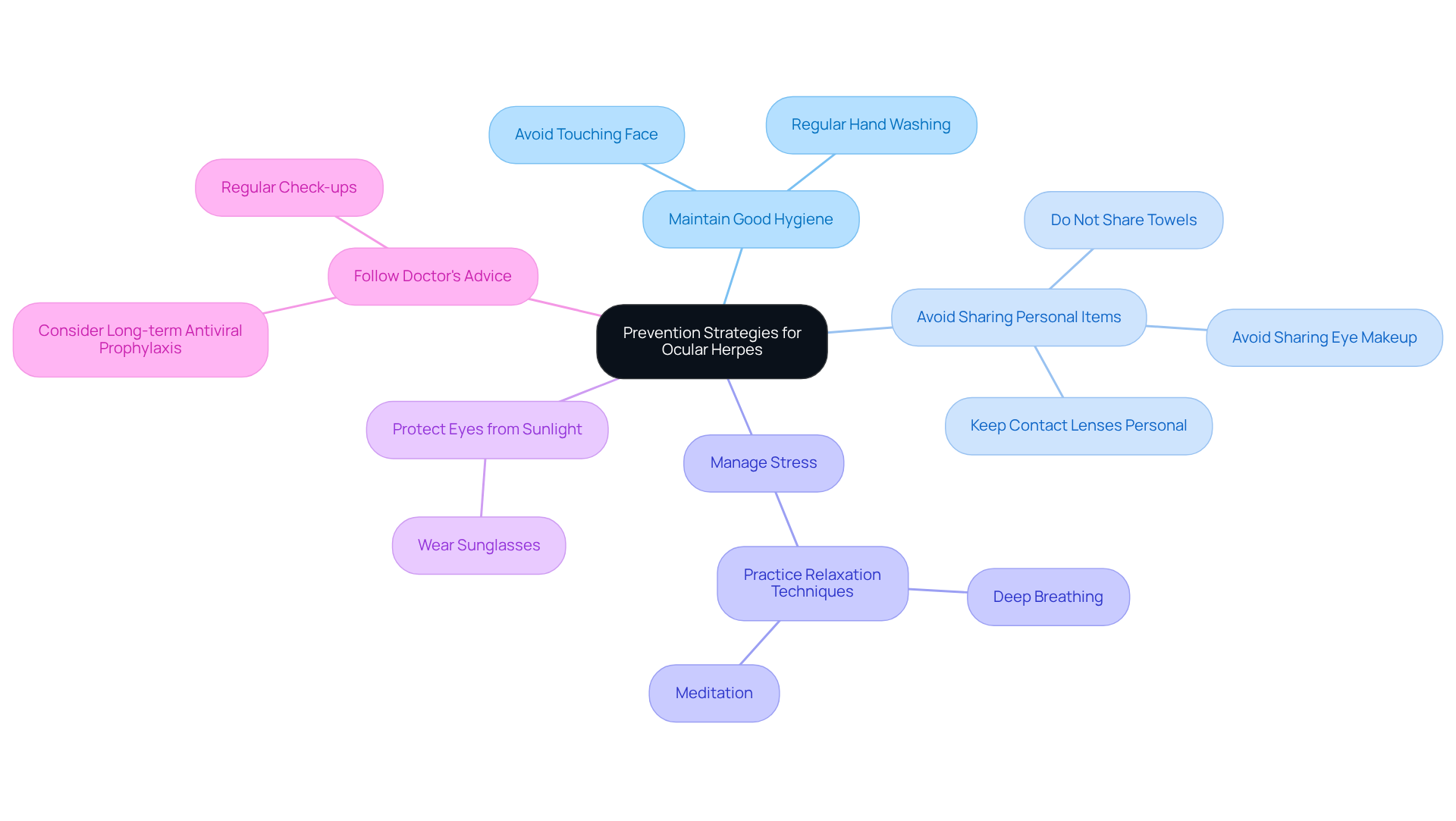Posted by: Northwest Eye in General on July 5, 2025
Overview
Ocular herpes, caused by the herpes simplex virus, can be a distressing experience. Symptoms such as eye redness, pain, tearing, light sensitivity, and blurred vision may arise, and it’s important to recognize that these can lead to serious complications if left untreated. We understand that dealing with these symptoms can be overwhelming.
Effective treatment options are available, including antiviral medications that can help alleviate your discomfort. Additionally, preventive strategies such as good hygiene and stress management are crucial for managing the condition and reducing the risk of recurrence. Remember, you are not alone in this; many others have faced similar challenges and found relief.
We encourage you to seek care and support, as taking action is vital for your well-being. By addressing your concerns and following recommended treatments, you can take significant steps towards recovery. We are here to help you through this process and ensure you feel supported every step of the way.
Introduction
Ocular herpes, a viral infection caused by the herpes simplex virus, poses significant risks to eye health and vision if not addressed promptly. We understand that this can be a concerning issue for many. Understanding its symptoms, treatment options, and prevention strategies is crucial for anyone looking to safeguard their eyesight. Yet, with so much information available, it’s common to feel overwhelmed.
How can individuals effectively navigate the complexities of this condition and ensure they are taking the right steps to protect themselves? We are here to help you through this process.
Define Ocular Herpes: Understanding the Basics
Ocular herpes, which is often referred to as simplex keratitis, is an eye condition caused by the herpes simplex virus (HSV), classified as either type 1 or type 2. We understand that dealing with an eye ailment can be concerning, especially when it affects the cornea—the clear front part of your eye. If not treated promptly, this viral infection can lead to significant complications, including vision loss. It’s common to feel anxious about such risks, but knowing the facts can help you take the right steps.
This virus is highly contagious and can spread through direct contact with infected bodily fluids or lesions. Understanding the fundamentals of eye infections is crucial for recognizing symptoms early and seeking prompt care. Remember, you are not alone in this; we are here to help you through this process. Your are our top priorities, and we encourage you to reach out if you have any concerns.

Identify Symptoms of Ocular Herpes: Key Indicators to Recognize
Symptoms of ocular herpes can vary, and we understand that it can be concerning to recognize them. Common symptoms include:
- Redness of the eye: You may notice a red or inflamed appearance, which can be alarming.
- Eye pain: Discomfort or pain in the eye is a frequent complaint that many experience.
- Tearing: Increased tear production may occur, leading to watery vision that can be bothersome.
- Sensitivity to light: It’s common to feel light sensitivity, known as photophobia, which can be uncomfortable.
- Blurred vision: Vision may become hazy or distorted. This can also indicate other conditions, such as or diabetic retinopathy, so understanding the potential causes of blurred vision is crucial. It may signal underlying eye diseases that require professional evaluation.
- A feeling of something in the eye: You might describe a sensation of a foreign body in your eye, which can be distressing.
Recognizing these symptoms of ocular herpes early is vital for effective management and treatment. We are here to help you through this process.

Explore Treatment Options for Ocular Herpes: From Medications to Home Care
Although treatment for ocular herpes can feel overwhelming, we are here to help you through this process. Typically, antiviral medications are the cornerstone of treatment, available in various forms to suit your needs:
- Topical antiviral eye drops: Medications like trifluridine or ganciclovir are commonly prescribed to combat the virus directly.
- Oral antiviral medications: For more severe cases of ocular herpes or recurrent infections, acyclovir or valacyclovir may be recommended.
- Corticosteroids: In some situations, steroid eye drops can be used to reduce inflammation and discomfort.
We understand that is crucial. Home care is also important; we advise you to avoid touching your eyes, maintain good hygiene, and use cold compresses to alleviate discomfort. Regular follow-ups with an eye care specialist are essential to monitor your recovery and adjust treatment as necessary. Remember, you are not alone in this journey, and support is always available.

Implement Prevention Strategies for Ocular Herpes: Reducing Recurrence Risks
To help you reduce the risk of ocular herpes recurrence, we want to share some compassionate prevention strategies that can make a difference in your daily life:
- Maintain good hygiene: We understand how important it is to take care of yourself. Regularly washing your hands, especially before touching your face or eyes, can significantly help.
- Avoid sharing personal items: It’s best to keep your personal items to yourself. Please refrain from sharing towels, eye makeup, or contact lenses with others to prevent potential outbreaks.
- Manage stress: We know that stress can be a trigger for outbreaks. Practicing relaxation techniques, such as deep breathing or meditation, may offer you some comfort and support.
- Protect your eyes from sunlight: Wearing sunglasses is a simple yet effective way to , which can sometimes exacerbate symptoms.
- Follow your doctor’s advice: If you have a history of ocular herpes, your eye care provider may recommend long-term antiviral prophylaxis to help prevent further recurrences. Regular check-ups are essential for monitoring your eye health, and we encourage you to stay proactive about your care.
Remember, we are here to help you through this process and support you in maintaining your eye health.

Conclusion
Ocular herpes, or simplex keratitis, is a viral eye condition that can significantly impact your vision if not addressed promptly. We understand that learning about this infection can be daunting, but recognizing its nature and symptoms is crucial for effective management and treatment. By being aware of the signs and seeking appropriate care, you can take proactive steps to safeguard your eye health and well-being.
Key indicators of ocular herpes—such as redness, pain, tearing, and blurred vision—serve as vital signals for early intervention. Treatment options, including antiviral medications and home care strategies, can alleviate symptoms and promote recovery. Additionally, implementing prevention strategies—like maintaining good hygiene and managing stress—can greatly reduce the risk of recurrence and enhance your overall eye health.
Ultimately, staying informed and vigilant about ocular herpes is essential for anyone affected by this condition. Embracing a proactive approach to eye care not only helps in managing symptoms but also empowers you to take control of your health. We encourage you to prioritize regular check-ups and follow professional advice, as these steps can lead to better outcomes and a healthier future.
Frequently Asked Questions
What is ocular herpes?
Ocular herpes, also known as simplex keratitis, is an eye condition caused by the herpes simplex virus (HSV), which can be classified as either type 1 or type 2.
What part of the eye does ocular herpes affect?
Ocular herpes primarily affects the cornea, which is the clear front part of the eye.
What are the potential complications of untreated ocular herpes?
If not treated promptly, ocular herpes can lead to significant complications, including vision loss.
How is ocular herpes transmitted?
Ocular herpes is highly contagious and can spread through direct contact with infected bodily fluids or lesions.
Why is it important to recognize symptoms of ocular herpes early?
Recognizing symptoms early is crucial for seeking prompt care and preventing serious complications related to the infection.
What should I do if I have concerns about ocular herpes?
If you have any concerns about ocular herpes, it is important to reach out for help and seek guidance from a healthcare professional. Your health and well-being are a priority.






